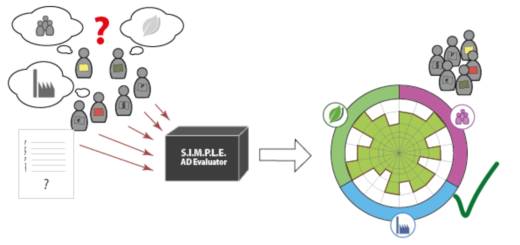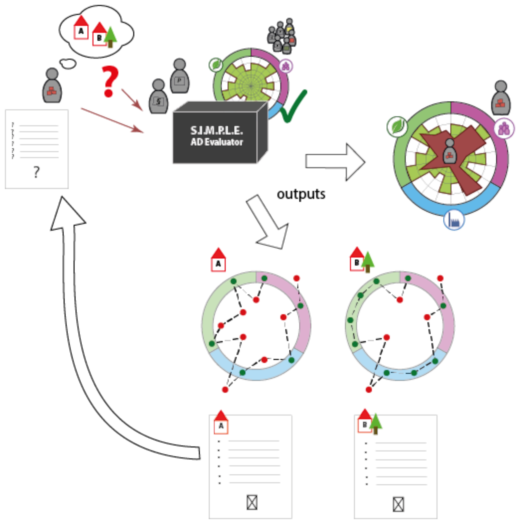SIMPLE AD Evaluator - S.I.M.P.L.E. Sustainable Integration Modeling and Predictive Leveraging Evaluator
Short Description
Background and Motivation
Many municipalities are suffering from great development pressure - dealing with challenges based on social and technical needs and with limited financial capacities. In addition, they have to comply with overarching sustainability goals (e.g. SDGs, spatial planning concepts).
In order to make viable decisions for sustainable community development, goals and frameworks need to be defined together, and expert knowledge is essential. Certificates for building and neighborhood based on assessments promise planning and decision support. These certification systems, as well as available pre-assessments, are able to assess concrete projects based on elaborated plans and designs.
In practice decision makers often deal with different planning alternatives, not yet specified in detail. The assessments based on certifications are linked to external audits during the assessment process, not focusing on the involvement of decision makers or project developers. These external audits are time and cost intensive processes and are therefore usually only used for larger projects.
There is a gap assessing project ideas and rough concepts within early planning phases. Moreover there are no possibilities for self assessments of planning alternatives that do not require external reviews and focus on cooperative planning processes, i.e. ideas and innovations based on project developers, community representatives, local experts and citizens.

Goals and Innovation
This project therefore aims to develop the concept study for a planning and decision support tool for evaluating "spatial sustainability" - the AD Evaluator. This enables planning stakeholders in all planning phases to evaluate planning alternatives, taking into account impacts and interactions, and at the same time identifies necessary measures to achieve objectives in the form of checklists.
Methodological Approach
The AD Evaluator enables sustainable spatial transformation from the idea to realization with a focus on strategic co-design and co-assessment. Project developers and decision-makers (municipality, state, federal government) can use the low-threshold approach of the AD Evaluator to carry out independent assessments to compare alternatives.
The AD Evaluator thus offers time- and cost-efficient planning support even for very early planning phases, where new ideas and innovations for sustainable spatial transformation can be introduced, and robust framework conditions and objectives can be strategically developed.
The AD Evaluator is implemented in Python, which enables a modular structure and easy transfer to other programming environments for later extensions and developments. The objectives and the planning project are mapped on the basis of questionnaires. The questionnaires are linked to System Dynamics models, which can weigh up impacts and interactions and enable an evaluation.

Expected results
The concept study visualizes spatial impacts and creates customised sustainability checklists. This makes it easier to implement global and regional sustainability goals in practice.
Project Partners
Project management
Dr. Julia Forster - TU Wien, Institute for Spatial planning, Research Unit of Local Planning, Spatial Simulation Lab
Project or cooperation partners
- adasca eU
- Stephan Stückler
Associated Partners
- KEM Energieparadies-Lavanttal
- KLAR! Klimaparadies-Lavanttal
- NÖ Dorf- und Stadterneuerung GmbH
Contact Address
Dr. Julia Forster, TU Wien, Institute of Spatial Planning
TU Wien E280-4
Karlsplatz 13
A-1040 Vienna
Tel.: +43 (1) 58801-280431
E-mail: julia.forster@tuwien.ac.at
Web: www.tuwien.at/ar/simlab
